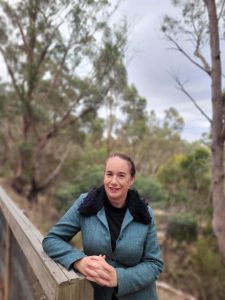
It wouldn’t be unusual to see Sue Grau riding her bike around Maria Island or exploring kunanyi/Mt Wellington. Source: Timberbiz
You’d just as likely find her enjoying dinner with friends in Salamanca, buzzing around the netball court, or hitting up the dance floor in a nightclub.
“My music tastes are very much in the present, reflecting a denial that I’m getting older,” Sue joked.
Despite growing up in Canberra – the ‘Bush City’ – Sue considers herself a true Tasmanian, having lived here for 20 years.
“Although Canberra is often written off for a lot of reasons, I loved growing up there. It’s close to the mountains, alpine areas and the NSW coast where I had family connections,” she said.
“I grew up walking my dog, bike riding to school and university and, through adventures further afield in these environments, also grew to love bushwalking and camping.”
Sue is no stranger to the forestry industry. The former CEO of the NSW Tasmanian Forest Products Association has recently taken the helm as Convenor of the Tasmanian Forests and Forest Products Network, and said she understands the importance of supporting everyone employed in an industry which contributes so much to the local community.
“This contribution is so much more than just economical. The industry is also an important part of the social fabric in our regional areas,” she said.
Sue most recently held the position of CEO at Salmon Tasmania and previously spent four years as Chief Executive of Oysters Tasmania. She said that like aquaculture, the forest industry has a complex image within the Tasmanian community.
“I’m very driven to provide an industry perspective that is based on science and relatable to our community,” Sue said.
“The work of the Network is particularly appealing because it’s an opportunity to focus on the individuals that work in the industry or within the broader forestry ‘family’.
“I’m excited by the opportunity to get to know the workforce of the industry and in particular, why people are drawn to working within it, and what they need to keep them motivated and supported.”
Sue describes her leadership style as collaborative, authentic and people-focused.
“In a practical sense, that means that I love people working together. I get pretty passionate about my work and I’m very approachable,” she said.
Sue believes industry bodies only exists because of its members and said she has already observed in her first few weeks the strength of the Network’s membership.
“I was fortunate enough to start as Convenor the week of the TFFPN’s Tasmanian Timber Awards, which was a great opportunity to meet lots of our members and valued Partners and Supporters,” she said.
“I was blown away at the representation in the room from across the whole timber value chain – from researchers, educators and seed collectors, to end users like builders, designers and architects—all celebrating each other and the industry they’re part of.
“I look forward to meeting more members over the coming months and learning what they expect from their Network.”
Sue acknowledged that at a broad community level there is disparity between society’s love and use of products, and people not understanding where the products come from or how they are grown.
“The longer this disparity continues the further industry falls behind. There are many lost opportunities to capitalise on the benefits of forestry, including the sector’s role in fighting climate change,” Sue said
After a staggering 19 house moves in 19 years (mostly in regional areas), the mum of two teenage boys now resides in West Hobart with her youngest son, Sean. In her spare time, she enjoys being outdoors and exploring Tassie’s natural beauty.
“I love walking the dog on the beach with Sean, bushwalking— especially with my oldest son Ronan when he’s back in town— and more recently, exploring options to volunteer my time in the community,” Sue said.
“I never tire of adventures and experiences. I especially love jumping into rivers and the sea following a long walk regardless of the time of year.”





